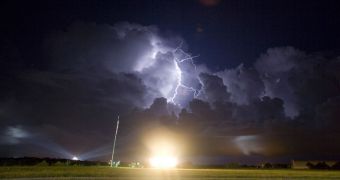NASA officials and mission controllers decided yesterday to postpone the launch of space shuttle Discovery to this evening, at 11:59 pm EDT (0359 GMT, August 29th). They chose not to attempt liftoff early in the morning, as first planned, amidst fears that the fuel valve that prevented a Tuesday launch would not function. After a ten-minute meeting yesterday, the people in charge of Discovery's STS-128 assembly flight to the International Space Station (ISS) decided to give engineers a few extra hours to conduct their repairs.
This is the third time NASA aborts plans of launching the shuttle this week. Previous problems with the valve, with the foam insulation on the craft's external tanks, and severe thunderstorms near Launch pad 39A, at the Kennedy Space Center, have all prevented the craft from blasting off on its 13-day mission. Today, the fueling procedure, which will add 526,000 gallons of super-cold liquid hydrogen and liquid oxygen propellant to the shuttle's 15-story external tanks, will begin at 2:34 pm EDT (1834 GMT), NASA spokesperson Allard Beutel has told Space.
“To make sure we [have] a truly bulletproof story, we decided to give them one more day,” the Head of the Discovery management team, Mike Moses, explained the official decision during a Thursday briefing. The main issue now is the hydrogen fuel fill-and-drain valve, which is located at the rear of the shuttle. In the fueling attempt that took place on Tuesday, NASA engineers failed to receive a signal from this instrument, to indicate that it was closed. Both this one and the oxygen valve need to function beyond perfectly in order for the agency to authorize any shuttle flight.
Engineers now believe that the valve in itself is not the issue, as it performed remarkably in five consecutive tests conducted two days ago. Rather, they say, it may be that the sensor detecting whether the “lid” is closed or not is defective and fails to properly interpret the valve's position. However, mission planners wanted to be on the safe side and give experts extra hours to make sure they got the root of the problem straight.
Discovery has until August 30th to launch. After that day, the take-off window closes until October 17th. In September, the ISS will be visited by two spacecraft, a new Japanese unmanned cargo vehicle, and a Russian Soyuz capsule, carrying new crew members and supplies aboard the station. The final verdict will be given later today, during the fueling sequence.

 14 DAY TRIAL //
14 DAY TRIAL //